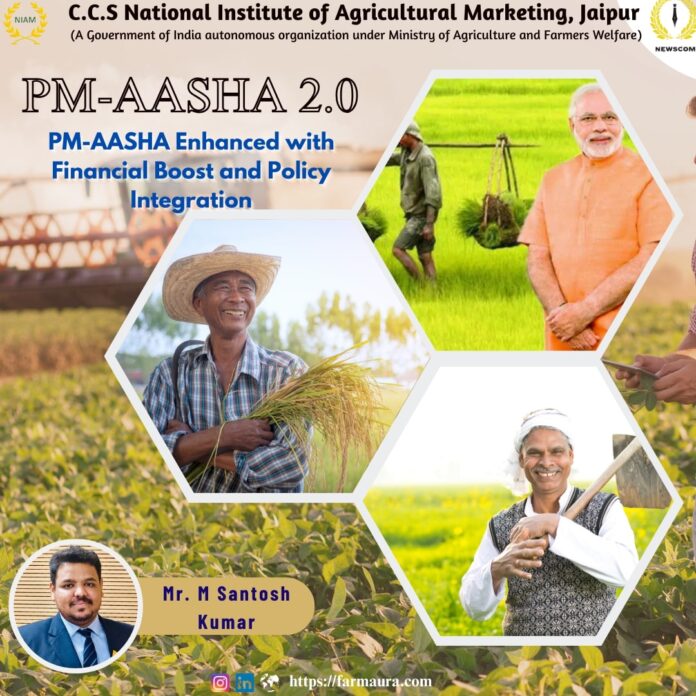The Union Cabinet of India has recently approved the continuation and enhancement of the Pradhan Mantri Annadata Aay Sanrakshan Abhiyan (PM-AASHA) on September 18, 2024, with a financial outlay of ₹35,000 cr for the scheme during the 15th Finance Commission cycle which extends until 2025-26. This decision highlights the government’s commitment to ensuring remunerative prices for farmers while stabilizing essential commodity prices for consumers.
Integration of Schemes for Better Efficiency
A major development in PM-AASHA is the integration of the Price Support Scheme (PSS) and the Price Stabilisation Fund (PSF). This integration is aimed at streamlining the mechanisms to ensure better prices for farmers and control price volatility in the agricultural market. By consolidating these efforts under one framework, the government seeks to simplify operations, minimize duplication, and provide efficient support to both farmers and consumers.
Expanded Procurement under Price Support Scheme (PSS)
The Price Support Scheme (PSS) has been expanded to cover 25% of the national production of pulses, oilseeds, and copra, starting from the 2024-25 season. Furthermore, the government has announced a 100% procurement guarantee for key pulses, including Tur, Urad, and Masur.
This procurement guarantee offers farmers a reliable safety net by assuring them of a minimum price for their crops, which is particularly critical in reducing the risk associated with price fluctuations. Encouraging the production of pulses also helps India reduce its reliance on imports, contributing to the country’s food security.
Price Deficiency Payment Scheme (PDPS) Extension
The Price Deficiency Payment Scheme (PDPS) has been extended, with coverage for notified oilseeds increasing from 25% to 40%, and the implementation period extended from three months to four months. Under PDPS, farmers are compensated when market prices fall below the Minimum Support Price (MSP), ensuring they do not suffer losses in times of price volatility.
Additionally, the PDPS has been extended to vegetables, allowing states to implement this model for vegetable crops. This is particularly significant as vegetables do not have a fixed MSP, leaving farmers vulnerable to sharp price drops. Under this scheme, the government compensates farmers for the difference between the market price and the government-set price for vegetables, offering them protection from price crashes.
The inclusion of vegetables under the PDPS is a critical step towards ensuring financial security for vegetable farmers, a group that often faces high price volatility due to the perishable nature of their produce and seasonal market fluctuations. By extending PDPS to vegetables, the government is broadening the scope of support to a larger segment of the agricultural community.
Market Intervention Scheme (MIS) for Perishable Crops
The Market Intervention Scheme (MIS) has also been updated to benefit farmers of perishable horticultural crops. The government has increased coverage under the MIS from 20% to 25% and introduced direct payments to farmers, streamlining the process and reducing the logistical complexities involved in physical procurement.
This measure is particularly important for farmers who grow fruits and vegetables, as these crops are highly vulnerable to supply chain disruptions and price drops. By providing direct payments, the government ensures that farmers receive timely support, helping them mitigate losses.
Financial Support and Fertiliser Subsidy
The government has also increased its procurement guarantee under PM-AASHA from ₹35,000 cr to ₹45,000 cr. This boost in financial commitment aims to secure better prices for farmers and encourage the cultivation of essential crops like pulses and oilseeds.
In addition, the Cabinet approved a subsidy of ₹24,475 cr for phosphatic and potassic (P&K) fertilizers for the rabi season (October 2024 – March 2025). This subsidy is crucial for ensuring that farmers have access to fertilizers at affordable prices, especially as international fertilizer costs continue to fluctuate. The availability of affordable fertilizers is critical for maintaining crop yields and ensuring food security during the rabi season.
Removal of Private Procurement and Stockist Scheme (PPPS)
The Private Procurement and Stockist Scheme (PPPS), which was launched as a pilot in 2018 to involve the private sector in the procurement of oilseeds, has been shelved due to a lack of interest from states and insufficient government support. Instead, states have opted for the more straightforward and effective Price Deficiency Payment Scheme (PDPS) and Price Support Scheme (PSS), which offer better incentives and easier implementation.
By focusing on PDPS and PSS, the government is strengthening existing public procurement schemes, ensuring that they are more effective and easier to implement without the complexities associated with private-sector involvement.
Conclusion
The recent updates to PM-AASHA represent a holistic approach to addressing the challenges of India’s agricultural sector. With expanded procurement, increased financial guarantees, and the inclusion of vegetables under PDPS, the government is taking significant steps to provide income security for farmers while stabilizing consumer prices. The decision to enhance the fertiliser subsidy further underscores the government’s commitment to supporting farmers through affordable agricultural inputs.




